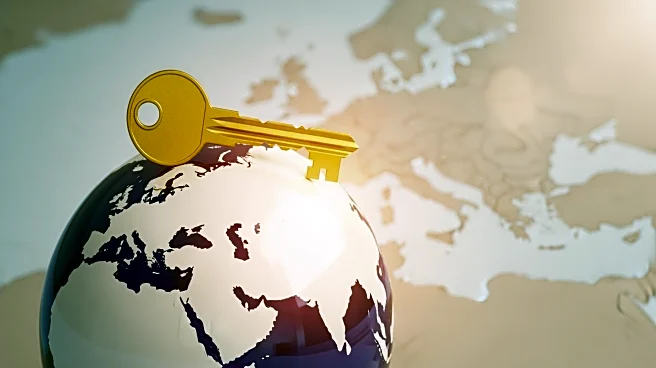What's Happening?
President Trump has granted Hungary a one-year exemption from U.S. sanctions on Russian oil exports, allowing the country to continue purchasing Russian energy without penalties. This decision comes after Hungarian Prime Minister Viktor Orbán's visit
to the White House, where he discussed the challenges Hungary faces in reducing its reliance on Russian fossil fuels due to its landlocked geography. Trump praised Orbán as a 'great leader' and acknowledged the difficulties Hungary faces in sourcing energy from alternative regions. The exemption aims to prevent economic disruption in Hungary, which heavily depends on Russian oil and gas.
Why It's Important?
The exemption raises questions about the effectiveness of U.S. sanctions on Russia, as it may encourage other nations to seek similar concessions, potentially undermining the sanctions' impact. Hungary's continued reliance on Russian energy contrasts with the European Union's efforts to phase out Russian oil imports following the invasion of Ukraine. The decision reflects the complex geopolitical dynamics and the balancing act between maintaining alliances and enforcing sanctions. It also highlights the influence of personal diplomacy in international relations, as Orbán's rapport with Trump appears to have played a role in securing the exemption.
What's Next?
The exemption could lead to increased scrutiny of the Trump administration's commitment to enforcing sanctions on Russia. Analysts warn that leniency towards allies might embolden other countries to circumvent sanctions, weakening their intended economic pressure on Russia. Additionally, discussions between Trump and Orbán about a potential summit with Russian President Vladimir Putin in Budapest could further complicate U.S.-Russia relations. The situation may prompt debates within the U.S. government and among international allies regarding the balance between strategic interests and sanction enforcement.
Beyond the Headlines
The decision to grant Hungary an exemption from sanctions may have broader implications for U.S.-EU relations, as it could be perceived as undermining collective efforts to isolate Russia economically. It also highlights the challenges faced by countries heavily reliant on Russian energy in transitioning to alternative sources. The exemption may influence Hungary's domestic politics, as Orbán's alignment with Trump and the MAGA movement could impact his standing both domestically and internationally.















